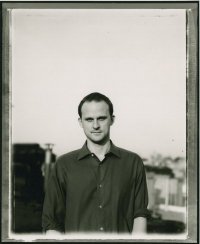 John Jeremiah Sullivan is a contributor to the New York Times Magazine and Southern editor for the Paris Review. He has written for GQ, Harper's and the Oxford American, and is the author of Blood Horses. His new book is Pulphead: Essays (Farrar, Straus & Giroux, October 25, 2011). He is the winner of a Whiting Writers' Award, two National Magazine Awards and the Pushcart Prize. He lives in Wilmington, N.C., with his wife and two daughters and, most weeks, his wife's entire family.
John Jeremiah Sullivan is a contributor to the New York Times Magazine and Southern editor for the Paris Review. He has written for GQ, Harper's and the Oxford American, and is the author of Blood Horses. His new book is Pulphead: Essays (Farrar, Straus & Giroux, October 25, 2011). He is the winner of a Whiting Writers' Award, two National Magazine Awards and the Pushcart Prize. He lives in Wilmington, N.C., with his wife and two daughters and, most weeks, his wife's entire family.
On your nightstand now:
The Mauve Decade by Thomas Beer--beat-up, cup-ringed first edition with faded original mauve boards. A strange and unplaceable book, a spiritual X-ray of the United States in the 1890s. Beer wove his tapestry out of hundreds of little items from small-town gossip columns. Faulkner claimed to have stolen from it. I've never figured out how (except maybe in a certain distance from the material, which is not nothing). The book is a great insomnia-killer, too, not because it's boring, but because you can begin or end anywhere. Beer meant it to be a slipstream.
Favorite book when you were a child:
Couldn't have chosen between Swiss Family Robinson and Shaggy Fur Face. Still can't.
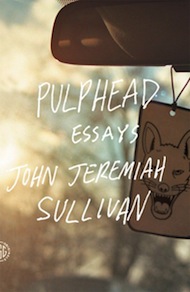 Your top 20 authors/books:
Your top 20 authors/books:
"Top" in the sense that they mean most to me at this moment, and with a proviso that each name is shorthand for maybe 20 others (my issue with lists: they always seem to take a certain pleasure in excluding, whereas reading is about expanding your taste, but everyone knows that...): Willa Cather, Edith Wharton, Defoe (his Journal of the Plague Year), Borges and Melville. Anne Carson. The Twain of A Tramp Abroad. William Byrd of Westover. Witold Gombrowicz's exile diaries. The Question of Hu by Jonathan Spence (given to me by friend fellow local Wilmington writer Dana Sachs--it's about a Chinese man who came to Paris in 1722 and went mad). The Faulkner of Absalom, Absalom! Chekhov's Longer Stories from the Last Decade. Terry Southern's Red-Dirt Marijuana and Other Tastes. William Carlos Williams, his In the American Grain and Paterson. Eudora Welty's The Wide Net and Other Stories. Barry Hannah's Airships and Ray. Flaubert's Sentimental Education and Balzac's Lost Illusions. Frederick Seidel and Mary Gaitskill. Denis Johnson, David Foster Wallace, David Grann. Zora Neale Hurston's folklore, Of Mules and Men and Go Tell My Horse. Cormac McCarthy's Tennessee novels. (That all still feels more or less random.)
Book you've faked reading:
Can't say, 'cause I hope to keep faking it. Although once, I did actually fake reading a book, in the sense that I held it before my face and moved my eyeballs over all the words, despite not knowing how to read. I was four. The book was Gorky Park by Martin Cruz Smith. My brother found me enacting this strange ritual in my closet, with a flashlight. It was like, I knew that adults were doing something important when they held books that way and turned the pages, and I wanted to be part of it.
Book you're an evangelist for:
D.H. Lawrence, Studies in Classic American Literature. I buy every used copy I see and give them to people who visit.
Book you've bought for the cover:
Black Sun: The Brief Transit and Violent Eclipse of Harry Crosby by Geoffrey Wolff. The inside turned out to be excellent, too.
Book that changed your life:
Every one, when I think about it. But in the spirit of the question, probably Rimbaud's Illuminations. Read it my senior year in high school and have essentially never recovered.
Favorite line from a book:
"There was nothing, not even the sand on the paths, that did not utter its cry." --Sam Beckett, Malone Dies.
Book you most want to read again for the first time:
Crime and Punishment. I never felt as complete a suspension of time as when I read that book. Seemed like it could have taken half an hour or half my life. It's as if Dostoevsky has your brain in his hands. It would be fun to feel that again. So few books give you that captivation.
 Barnes & Noble has expanded BN.com Marketplace, adding more than a million new products to the catalogue through a deal with several online partners, including Wayfair.com, Right Start, UnbeatableSale.com, School Specialty, Abe's of Maine, Delivery Agent and more.
Barnes & Noble has expanded BN.com Marketplace, adding more than a million new products to the catalogue through a deal with several online partners, including Wayfair.com, Right Start, UnbeatableSale.com, School Specialty, Abe's of Maine, Delivery Agent and more. 








BINC.0325.T2.SUSANKAMILEMERGINGWRITERSPRIZE.jpg)
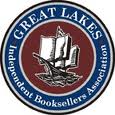 The Great Lakes Independent Booksellers Association and the Midwest Independent Booksellers Association are considering a joint trade show, which, if it happens, would be held in MIBA territory next year and GLIBA territory in 2013.
The Great Lakes Independent Booksellers Association and the Midwest Independent Booksellers Association are considering a joint trade show, which, if it happens, would be held in MIBA territory next year and GLIBA territory in 2013.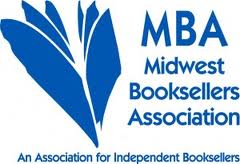 In an association e-mail, GLIBA executive director Deb Leonard asked for members' opinions on the idea. She noted that "the distance is a concern for many of you. We are working on a plan that help defray travel costs, probably based on how far you have to go." A decision will likely be made in the next few weeks.
In an association e-mail, GLIBA executive director Deb Leonard asked for members' opinions on the idea. She noted that "the distance is a concern for many of you. We are working on a plan that help defray travel costs, probably based on how far you have to go." A decision will likely be made in the next few weeks.
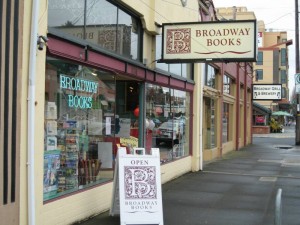 Bookselling This Week profiled
Bookselling This Week profiled 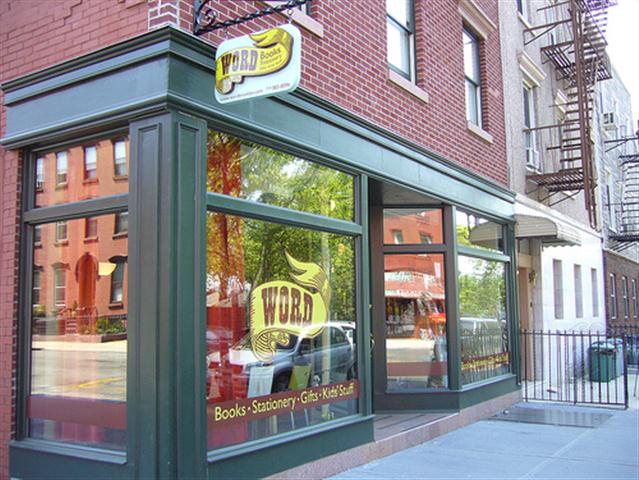 In its City Room section, the
In its City Room section, the 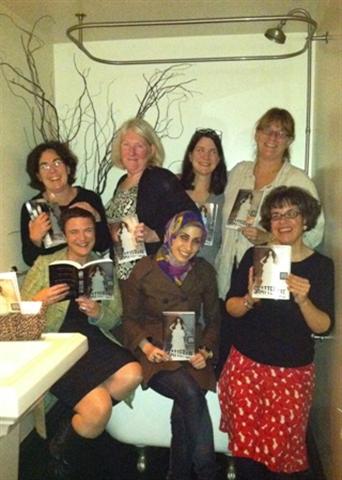 After having dinner with Taherah Mafi, whose debut YA novel, Shatter Me!,will be published by HarperCollins November 15, guests posed with the novelist in the bathroom at Crush, Seattle, Wash. Back row (from l.): Tracy Taylor, Elliott Bay Book Company; Judy Hobbs, Third Place Books; Lauren Mayer, University Book Store; and Renee Kirkpatrick, Third Place Books. Front row (from l.): Stesha Brandon, University Book Store; author Mafi; and Caitlin Baker, University Book Store.
After having dinner with Taherah Mafi, whose debut YA novel, Shatter Me!,will be published by HarperCollins November 15, guests posed with the novelist in the bathroom at Crush, Seattle, Wash. Back row (from l.): Tracy Taylor, Elliott Bay Book Company; Judy Hobbs, Third Place Books; Lauren Mayer, University Book Store; and Renee Kirkpatrick, Third Place Books. Front row (from l.): Stesha Brandon, University Book Store; author Mafi; and Caitlin Baker, University Book Store.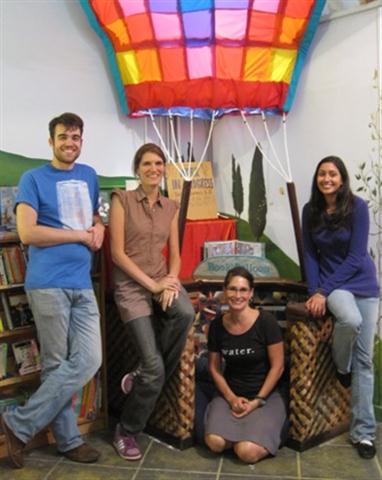 Congratulations to the
Congratulations to the 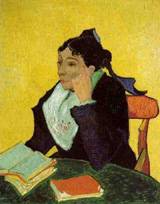 "I think it's going to be many years before there's a formal portrait where the sitter is clutching his or her Kindle or iPad. I'm not at all concerned that the interest in the book is going to disappear," said
"I think it's going to be many years before there's a formal portrait where the sitter is clutching his or her Kindle or iPad. I'm not at all concerned that the interest in the book is going to disappear," said 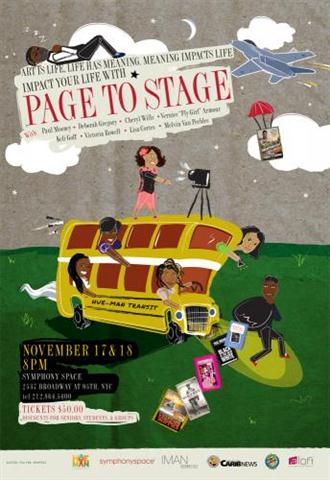 Hue-Man Bookstore in New York City and Symphony Space are launching a multimedia production called Page to Stage, a "concert of words" in which books will be the "symphonic foundation" for performances and conversation. The first Page to Stage shows will be held November 17 and 18. Several directors, including Ozzie Jones, will re-imagine the works of, among others, filmmaker Melvin Van Peebles, Young and Restless star Victoria Rowell, comedian Paul Mooney, and Vernice "FlyGirl" Armour, the country's first female African-American combat pilot. Then filmmaker Lisa Cortes will moderate a panel and lead an audience discussion. Authors will sign books after the event. Page to Stage benefits the Melvin Van Peebles Foundation to promote literacy.
Hue-Man Bookstore in New York City and Symphony Space are launching a multimedia production called Page to Stage, a "concert of words" in which books will be the "symphonic foundation" for performances and conversation. The first Page to Stage shows will be held November 17 and 18. Several directors, including Ozzie Jones, will re-imagine the works of, among others, filmmaker Melvin Van Peebles, Young and Restless star Victoria Rowell, comedian Paul Mooney, and Vernice "FlyGirl" Armour, the country's first female African-American combat pilot. Then filmmaker Lisa Cortes will moderate a panel and lead an audience discussion. Authors will sign books after the event. Page to Stage benefits the Melvin Van Peebles Foundation to promote literacy.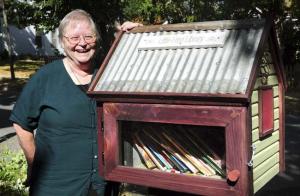 "It's fun watching people go by and looking at it and figuring out. People seem to know (what it is and) they want to know how it got started and why," said Sage Holben, a library technician at Metropolitan State University and the steward of "the sage-green, house-shaped box sits in the middle of a public garden at East Fourth Street and Bates Avenue."
"It's fun watching people go by and looking at it and figuring out. People seem to know (what it is and) they want to know how it got started and why," said Sage Holben, a library technician at Metropolitan State University and the steward of "the sage-green, house-shaped box sits in the middle of a public garden at East Fourth Street and Bates Avenue." 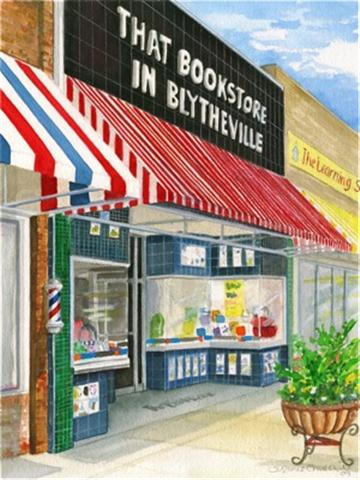 At
At 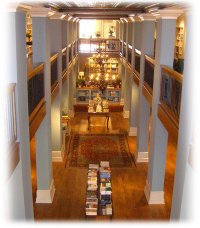 This fall,
This fall,  John Jeremiah Sullivan is a contributor to the New York Times Magazine and Southern editor for the Paris Review. He has written for GQ, Harper's and the Oxford American, and is the author of Blood Horses. His new book is Pulphead: Essays (Farrar, Straus & Giroux, October 25, 2011). He is the winner of a Whiting Writers' Award, two National Magazine Awards and the Pushcart Prize. He lives in Wilmington, N.C., with his wife and two daughters and, most weeks, his wife's entire family.
John Jeremiah Sullivan is a contributor to the New York Times Magazine and Southern editor for the Paris Review. He has written for GQ, Harper's and the Oxford American, and is the author of Blood Horses. His new book is Pulphead: Essays (Farrar, Straus & Giroux, October 25, 2011). He is the winner of a Whiting Writers' Award, two National Magazine Awards and the Pushcart Prize. He lives in Wilmington, N.C., with his wife and two daughters and, most weeks, his wife's entire family. Your top 20 authors/books:
Your top 20 authors/books: 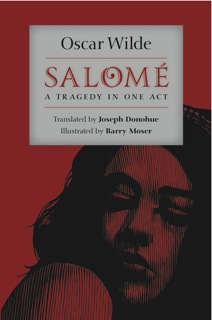 During an 1891 sojourn in Paris, Oscar Wilde was inspired by discussions with Stéphane Mallarmé and other Symbolist poets to set himself a challenge: he would take a tale from the Bible and set it as drama, but he would write it in French, not English. Like the Symbolists, Wilde was drawn to tales of decadence and beauty and he couldn't do much better than the story featuring Salomé. A teenage princess of Judea, she became obsessed with John the Baptist, a prisoner of Herod, her stepfather, and ended up demanding John's head on a platter in exchange for performing the Dance of the Seven Veils. Wilde had a ball piling on out-of-control lust, family dysfunction, artsy striptease, beheading of a prophet and necrophilia for maximum theatrical effect. He did so, however, in highly stylized language that Joseph Donohue argues makes the drama in French one of "the greatest prose poems of them all."
During an 1891 sojourn in Paris, Oscar Wilde was inspired by discussions with Stéphane Mallarmé and other Symbolist poets to set himself a challenge: he would take a tale from the Bible and set it as drama, but he would write it in French, not English. Like the Symbolists, Wilde was drawn to tales of decadence and beauty and he couldn't do much better than the story featuring Salomé. A teenage princess of Judea, she became obsessed with John the Baptist, a prisoner of Herod, her stepfather, and ended up demanding John's head on a platter in exchange for performing the Dance of the Seven Veils. Wilde had a ball piling on out-of-control lust, family dysfunction, artsy striptease, beheading of a prophet and necrophilia for maximum theatrical effect. He did so, however, in highly stylized language that Joseph Donohue argues makes the drama in French one of "the greatest prose poems of them all."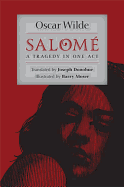
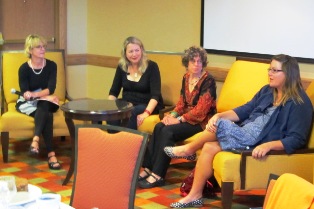 So how did I decide these were the ARCs I would read next? And why read them at the same time? It took a trip across the country to make the decision for me. On October 1, I was in Denver at the MPIBA trade show, where Cathy Langer, lead book buyer for the Tattered Cover Book Store, introduced her three guests--Strayed, Benaron and Houston--at an "Authors of Future Releases Breakfast."
So how did I decide these were the ARCs I would read next? And why read them at the same time? It took a trip across the country to make the decision for me. On October 1, I was in Denver at the MPIBA trade show, where Cathy Langer, lead book buyer for the Tattered Cover Book Store, introduced her three guests--Strayed, Benaron and Houston--at an "Authors of Future Releases Breakfast." 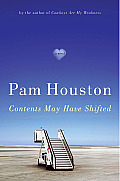 "You take the stuff that happened in your life and you shape it into something beautiful," said Houston, whose protagonist in Contents May Have Shifted shares her first name. She recalled that her editor told her "we want them to think it's Pam and it's not Pam," but Houston also cautioned that she moves freely across the blurred borderline between fiction and nonfiction. "I was James Frey's first writing teacher. He took intro to creative writing from me," she said, drawing a laugh.
"You take the stuff that happened in your life and you shape it into something beautiful," said Houston, whose protagonist in Contents May Have Shifted shares her first name. She recalled that her editor told her "we want them to think it's Pam and it's not Pam," but Houston also cautioned that she moves freely across the blurred borderline between fiction and nonfiction. "I was James Frey's first writing teacher. He took intro to creative writing from me," she said, drawing a laugh. 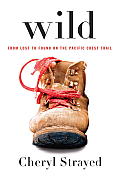 Strayed discussed her approach with Wild, which is an account of something that occurred 16 years ago. "My book is me, but it's sort of the younger me." With her first novel, Torch, "I took my life and made a lot of other stuff up about it. To me, the job of the nonfiction writer is to say, 'Here's me'; to make that personal story a universal one."
Strayed discussed her approach with Wild, which is an account of something that occurred 16 years ago. "My book is me, but it's sort of the younger me." With her first novel, Torch, "I took my life and made a lot of other stuff up about it. To me, the job of the nonfiction writer is to say, 'Here's me'; to make that personal story a universal one."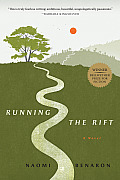 Benaron, who was writing about a country and culture with which she has developed a deep personal connection, observed: "I think this complex layering of truth and fiction makes a powerful statement about art."
Benaron, who was writing about a country and culture with which she has developed a deep personal connection, observed: "I think this complex layering of truth and fiction makes a powerful statement about art."